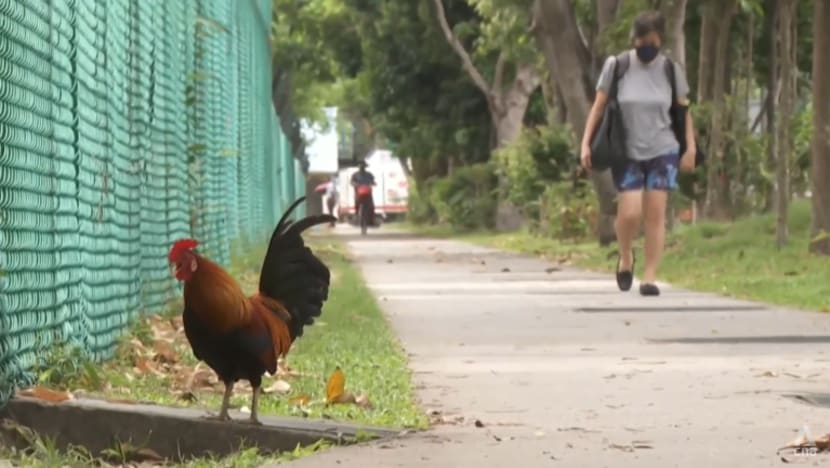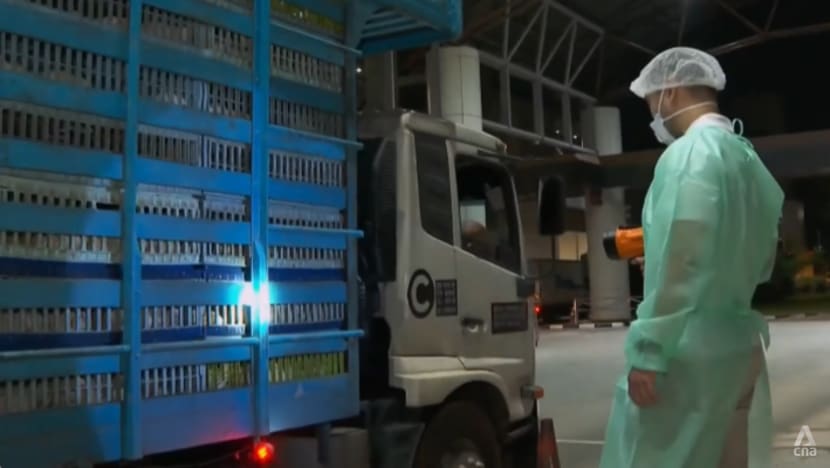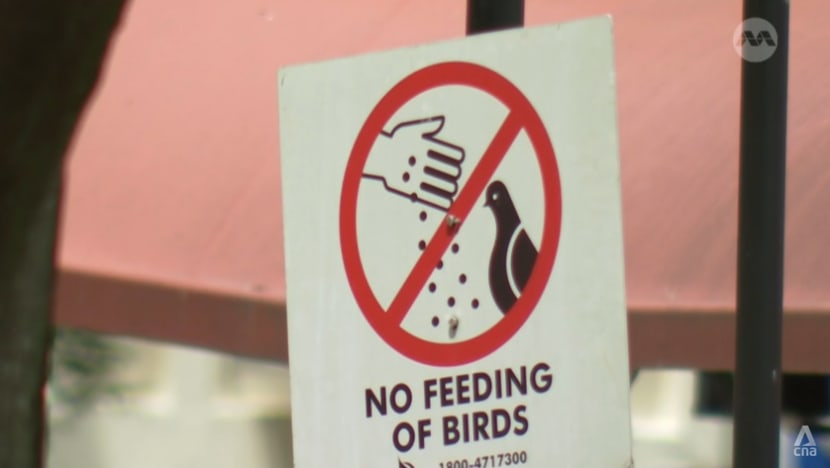Authorities issue bird flu advisory, warn against touching or feeding wild birds
While there are no known cases of H5N1 in Singapore so far, authorities said that bird flu is endemic in the region and stressed a need to stay vigilant and safeguard against infections.

A chicken roams around a neighbourhood in Singapore. Authorities are advising members of the public not to touch or feed wild birds, including free-roaming chickens, as a precaution against avian flu, or H5N1.

This audio is generated by an AI tool.
SINGAPORE: The authorities are advising members of the public not to touch or feed wild birds as a precaution against avian flu, or H5N1.
This includes steering clear of free-roaming chickens often spotted around neighbourhoods in Singapore.
Also called bird flu, the avian influenza has in recent weeks infected humans in Australia and the United States.
While there are no known cases of the virus in Singapore so far, authorities said that bird flu is endemic in the region and stressed a need to stay vigilant and safeguard against infections.
STRICT PRECAUTIONARY MEASURES
Singapore has multiple rings of defence against highly pathogenic strains of avian influenza, which can cause severe disease or death for birds, as well as flu-like symptoms in humans.
In a joint statement, the Animal and Veterinary Service (AVS) – an arm of the National Parks Board (NParks) – and the Singapore Food Agency (SFA) said they work closely to put in place precautionary measures.
For example, they engage overseas authorities on the matter of bird flu, and conduct regular inspections of imported birds at farms and shops. AVS also tests migratory birds for avian influenza.
Imported fowl and poultry products can only come from approved sources, which will be banned if any H5N1 case is found.
This means that poultry supply – including eggs – can fluctuate from time to time.
SFA said the food industry is encouraged to diversify and import from various sources to remain resilient in times of disease outbreaks and supply disruptions. As of last year, 30 countries are allowed to export poultry to Singapore.

The agencies also reminded veterinarians and bird owners to look out for any possible infections in their birds.
They added that those working in close contact with birds are advised to observe good personal hygiene and take necessary measures such as wearing protective equipment.
Animal rescue services, for instance, have procedures in place to mitigate risks of disease transmission while handling wildlife, including birds.
“Our protocol is – we must wear gloves. For pigeons and (other birds), we'll wear masks, usually N95 masks and a face shield if needed,” said Mr Joe Kam, a wildlife specialist at JK Wildlife.
The licensed NParks contractor handles an average of 15 dead or injured birds each week.
After handling animals, officers are required to clean and sanitise their hands and disinfect equipment.
MINIMISE HUMAN-WILDLIFE INTERACTION
Mr Kam said members of the public must also do their part.
Feeding remains one of the biggest interaction between humans and wildlife in Singapore, he said, adding that such close contact carries risks of disease transmission.
“To minimise human-wildlife interaction, we have to manage our food provision, which includes feeding and waste management. We have to minimise animals coming to us for food, looking into the bins, etc,” Mr Kam noted.
“Birds congregate because of the food, (when humans feed them). So, please do not feed the birds.”
Feeding wildlife – including birds – can dirty the surroundings and invite pests, according to NParks. Those caught feeding wildlife in Singapore can be fined up to S$10,000 (US$7,400).

AVIAN FLU TRANSMISSIONS ARE RARE
Still, migratory birds can fly above border controls and bring avian viruses. However, experts say bird-to-human transmissions are relatively rare.
Ms Veronica Foo, chairperson of the bird group at Nature Society Singapore said migratory birds do not congregate at farms or crowded areas.
Instead, they are usually found at open water sources including ponds, lakes and reservoirs, such as Kranji Marshes or Sungei Buloh Wetland Reserve.
She said agencies are keeping an eye on migratory birds’ activities at hotspots.
“We have a concerted multi task force of agencies which has set up a surveillance network to ensure that biosecurity measures are in place,” she said.
“They will do checks on the water and migratory birds, like taking samples of the faecal matter, and test to make sure that they are free from the virus.”
SAFE TO VISIT BIRD PARADISE
Meanwhile, the Mandai Wildlife Group said that visiting Bird Paradise and the Singapore Zoo remains safe.
The parks have strict biosecurity measures in place that include regular health checks, disease screening and quarantines to ensure birds are healthy and prevent outbreaks.
Authorities also warned those travelling to take extra precautions, especially when visiting countries with reported cases.
The Health Ministry (MOH) is strongly advising travellers not to go to live bird markets or dairy farms when abroad, and not to consume uncooked meat or raw milk. This is because other animals like cows can also catch the bird flu.
Herds of cattle in several US states were detected with the virus last month, and at least three dairy farm workers were infected.
The World Health Organization (WHO) has voiced concerns over the H5N1’s growing spread among wild birds, poultry, and cattle.
However, it said public health risk continues to be low. Since 2021, there have been 28 reported cases in humans worldwide, but no human-to-human transmission.
MOH said avian influenza viruses do not easily infect humans and other mammals. Almost all human cases of avian influenza reported overseas have had close contact with infected birds and poultry, or contaminated environments.
If any member of the public spots a suspected case, they can report it to AVS via its website or hotline.

















